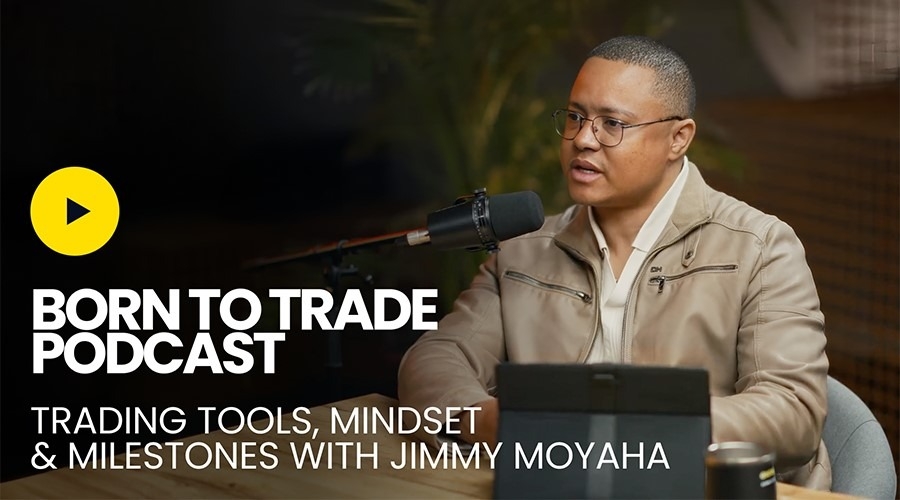
Trading may look like a fast path to financial freedom, but for those who stick around, it quickly reveals its complexity and the discipline it demands. In Episode 4 of the Born to Trade podcast, host Nima Siar of Exness sits down with Jimmy Moyaha, a trader, entrepreneur, and host of the SAfm Market Update with Moneyweb, to explore what it really takes to succeed in the markets. With nearly a decade of experience across financial markets, asset management, and private equity, Jimmy’s journey is grounded in one key theme: resilience.
From accidental encounters to finding your path
Unlike many professionals who plan their way into trading, Jimmy’s introduction to the markets was unplanned. “I studied accounting at university and worked in mining, but found myself in a brokerage environment and kind of fell in love with the space,” he shares. “What began as a detour quickly became a calling. It was a completely different world to traditional finance. That was partly what drew me to it.”
Pivotal moments that define a trader
From the US election of 2016 and the pandemic, Jimmy points to major global events as shaping moments. “Each came with significant learning curves,” he explains. “Those kinds of pivotal events in history have greatly influenced how you perceive the markets, how you handle the markets, and how you respond to what's happening.”
These lessons weren’t theoretical–they were lived. And each one refined Jimmy’s trading philosophy: success in the markets isn’t about luck or timing. It’s about understanding risk, staying informed, and maintaining the discipline to stick to your strategy.
Revealing the great misconception
For Jimmy, the most damaging misconception is that trading is easy. “It’s complicated and sophisticated–if you’re going to do it right,” he says. “Some of the best traders I know have a win rate of less than 50%, which speaks to the complexities involved.”
His own early days mirrored this learning curve. “I also thought it might be relatively easy because I didn’t understand the product I was dealing with. It was a very steep learning curve, and it takes a lot of resilience to get through all the learning.” And with trading, you’re constantly learning.
Why education must come first
One of Jimmy’s biggest contributions to the trading community is the creation of a financial education academy in South Africa. “It wasn’t just an add-on—it was fundamental,” he says. “You cannot come into something that you know nothing about and not educate yourself. Building out that academy was to service a need that could service a bigger one. A bigger part of the ecosystem, a bigger part of making people financially literate.”
For Jimmy, this isn’t just about helping traders place better trades. It’s about preparing them to survive in the market. “Even if you don’t use the knowledge to trade directly, concepts like demand and supply or market dynamics are vital. Without that foundation, you’re always reacting instead of planning.”
Skills are taught, mindset is everything
When asked whether successful traders are born or made, Jimmy doesn’t hesitate. “Very few skill sets can’t be taught,” he says. “But they have to be taught properly, not through quick fixes. At a surface level, trading is something you can learn very quickly if you want to, but it's something I would advise that you learn in detail and not try a quick fix with it.”
Trading is one of those environments where if you learn the skillset no one can ever take away from you, something you can apply anywhere in the world, he adds. It’s often pressure—financial obligations, unemployment, lack of opportunity—that leads traders to mistakes and losses. “But not many people come back after a setback.”
Discipline is the unspoken rule
Of all the qualities a trader must develop, Jimmy believes discipline is the hardest—and the most important. Discipline, he believes, is one of the cornerstones of a long-term trader. “A disciplined trader knows how to stick to their trading plan. A disciplined investor knows how to look at the bigger picture of their investment strategy. A disciplined market participant understands not to be moved by certain noise.”
He shares an example from Donald Trump’s first presidential term: Every time the president opened Twitter, the markets went crazy. By the second time around, markets learned to anticipate it. The discipline and ability to distinguish real signals from noise is critical.
Are traders born or made?
So, is trading an innate skill or one that’s built over time? “There are things you can teach, like how to trade, but there are also things in your DNA,” Jimmy reflects. “Risk tolerance, emotional control, how to handle disappointment, these are deeply personal.”
”I've genuinely walked that journey asking myself: Do I have the skillset? Am I born for this? Can I handle stress? How does my personality type handle disappointment? These things cannot be taught by anyone else other than yourself. You are the only one who knows you best.” In the end, Jimmy says, “I was born to trade–but I also had to make myself a trader.”
